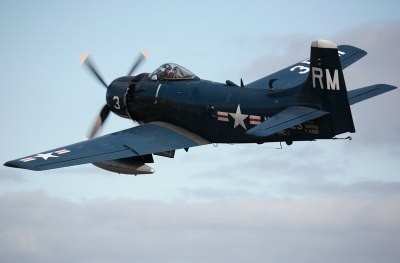Wed, Dec 25, 2013
Landed His Airplane After Being Blinded By Enemy Fire
His Skyraider had been hit. Fragments of the airplane had pierced his eyes. And somehow, Navy pilot Ensign Kenneth Schechter managed to land his crippled airplane at a remote Army dirt strip in Korea, guided by his best friend on the USS Valley Forge; Lt. j.g. Howard Thayer.

Schechter lost his right eye, but lived until December 11th, when he passed away from prostate cancer at the age of 83.
The Los Angeles Times reports that Schechter's plane was hit during a mission to bomb rail and truck lines on his 27th combat sortie over Korea. He recalled in a 1995 interview that he poured his canteen over his head in an effort to wash the blood from his face. He said he briefly saw his instrument panel through a red haze, and then nothing.
Thayer said that during the return flight, he saw Schechter struggling to remain conscious and control his plane. Searching desperately for any place to land that didn't involve bailing out over the ocean, he remembered a rutted airstrip called "Jersey Bounce" that had been used by recon aircraft. Flying just feet from the stricken Skyraider, he guided his friend to the strip. When Thayer told Schechter to put his wheels down, the injured pilot reportedly said "to hell with that," adding that a gear-up landing would probably be more survivable on the rough airstrip.
He was right, and he did survive. Schechter eventually earned a bachelor’s degree from Stanford and a Master's degree from Harvard Business School.
Schechter was awarded the Distinguished Flying Cross in the mid-1960s, but it took intervention from his Congressman to have the medal presented. The Navy had never received the proper paperwork for the commendation.
Thayer died in 1961, again attempting to help a fellow pilot. He was guiding another airplane which had suffered an electrical system failure when both went down in the Mediterranean. Neither Thayer nor the other pilot was ever recovered. Thayer was posthumously awarded the Distinguished Flying Cross in 2009.
(Skyraider image from file)
More News
From 2023 (YouTube Edition): A Moniker Well-Chosen Founded in 2021 by serial entrepreneur David Mayman and headquartered in New York City, Mayman Aerospace is the designer and manu>[...]
The Controller Provided The Pilot With A Low Altitude Alert And The Altimeter Setting That Was Current At The Time On October 13, 2025, at about 0815 eastern daylight time, a Socat>[...]
Outer Marker A marker beacon at or near the glideslope intercept altitude of an ILS approach. It is keyed to transmit two dashes per second on a 400 Hz tone, which is received aura>[...]
Aero Linx: Seaplane Pilots Association The Seaplane Pilots Association is the only organization in the world solely focused on representing the interests of seaplane pilots, owners>[...]
“While business aviation is fully included in the FAA’s traffic reductions, we know that our sector will continue to pursue mandatory and voluntary means to ensure we a>[...]
 Classic Aero-TV: Mayman Aerospace Speeder Dazzles Oshkosh Crowds
Classic Aero-TV: Mayman Aerospace Speeder Dazzles Oshkosh Crowds NTSB Prelim: Socata TBM 700
NTSB Prelim: Socata TBM 700 ANN's Daily Aero-Term (11.11.25): Outer Marker
ANN's Daily Aero-Term (11.11.25): Outer Marker ANN's Daily Aero-Linx (11.11.25)
ANN's Daily Aero-Linx (11.11.25) Aero-News: Quote of the Day (11.11.25)
Aero-News: Quote of the Day (11.11.25)



